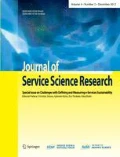Abstract
Because of emergence of new logic which is Service Dominant Logic focused on intangible resources, the co-creation of value, and relationships Service dominant logic assumed a major category of economic activity in developed countries around the world, reason is that service is an interactive process of “doing something for someone” that is valued. There is a need to understand each service sector under this logic. Many researchers are working on Service dominant logic and its impact on different aspects. And for this purpose, we have chosen Easypaisa and MobiCash to understand the fund transfer system of both service systems under this service dominant logic and studied different aspects of this service exchange to better understand how value and experience are evaluated. In this Study, the Service system of Easypaisa and the service system of MobiCash are compared under the concepts of Service system. We have conducted interview with respective person of each service system and collected information and data on each concept of service. We have used Interview Guide given by Lyons and Tracy (2013) to collect data on service system concepts. We find out that Service system of Easy paisa is covering almost all concepts of Service system but comparatively MobiCash is far behind from Easypaisa. Our analysis showed that Easypaisa is much better than MobiCash because Easypaisa rapidly built a high performing national footprint, relying exclusively on the GSM channel.
Similar content being viewed by others
References
Bettencourt LA, Lusch RF, & Vargo SL (2014) A service lens on value creation: Marketing’s role in achieving strategic advantage. California Management Review 57(1):44–66.
Constantin JA & Lusch RF (1994) Understanding resource management. Oxford, OH: The Planning Forum.
He Y, Akaka MA, Lusch RF, & Vargo SL (2017) Service–dominant logic: a review and assessment. In Review of marketing research (pp. 149–191). Routledge.
Hunt SD (1999) A general theory of competition: Resources, competences, productivity, economic growth. Sage Publications.
Lyons K & Tracy S (2013) Characterizing organizations as service systems. Human Factors and Ergonomics in Manufacturing & Service Industries, 23(1):19–27.
Lusch RF & Nambisan S (2015) Service innovation: A service–dominant logic perspective. MIS Quarterly 39(1):155–175.
Penrose ET (1959) The theory of the growth of the firm. New York: Sharpe.
Prahalad CK & Hamel G (1999) The core competence of the corporation. Knowledge and Strategy:41–59.
Shaw AW (1912) Some problems in market distribution. The Quarterly Journal of Economics 26(4):703–765.
Malthus TR (1798) An essay on the principle of population as it affects the future improvement of society, with remarks on the speculations of Mr.
Goodwin, M. Vargo SL & Morgan FW (2005) Services in society and academic thought: an historical analysis. Journal of Macromarketing 25(1):42–53.
Vargo SL & Lusch RF (2017) Service–dominant logic 2025. International Journal of Research in Marketing 34(1):46–67.
Vargo SL & Lusch RF (2008) Why “service”?. Journal of the Academy of Marketing Science 36(1):25–38.
Weld LDH (1916) The marketing of farm products. Macmillan.
Zimmermann EW (1951) World resources and industries.
Author information
Authors and Affiliations
Corresponding author
Additional information
Huma Gorsi is a PhD Scholar in University of Management & Technology (UMT) and holds an M. Phil degree in Business Administration. Her area of interest are Research, Management and Value Co-Creation.
Arooj Siddique is the PhD Scholar at University of Management and Technology (UMT) Lahore, Pakistan. She holds a degree of M.Phil in Business Administration. Her areas of interest are Service Marketing, Service Science and Service Dominant Logic.
Taimoor Basharat is the Senior Manager, Sales & Marketing at Association for Academic Quality (AFAQ), Pakistan. He holds a degree of M.Phil in Business Administration. His area of interests are research, service science, sales & marketing and analytical analysis of the data of his field.
Saroop Anwer, a Ph.D scholar, secured his Master Degree in Business Administration and BS (honors) in Computer Science. He has the International Research Exposure in the field of ERP Implementation, Information Technology based Learning Systems for Young Learners, Supply Chain & Logistics Management and Service Science. Currently offering his services to The University of Lahore, Pakistan as Assistant Professor & Education Counselor
Hammad Ahmad is the Doctoral Student at University of Management & Technology, Lahore, Pakistan. He is an Assistant Professor in The University of Lahore, Pakistan. His area of interest are research, service science, sales & marketing and learning and development.
Rights and permissions
About this article
Cite this article
Ghorsi, H., Siddiqui, A., Basharat, T. et al. Service System of Easypaisa and MobiCash: Funds Transfer System via Telecommunication Companies in Context of Service Dominant Logic. J Serv Sci Res 10, 249–273 (2018). https://doi.org/10.1007/s12927-018-0009-7
Received:
Accepted:
Published:
Issue Date:
DOI: https://doi.org/10.1007/s12927-018-0009-7




